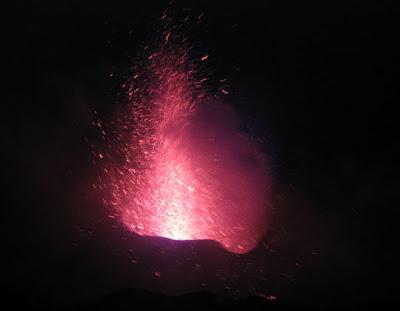
Stromboli Explosion
My friend Gretchen Woelfle recently went to Sicily and sent me this report. Part I, last week, focused on cathedrals and ancient ruins. This week Gretchen visits Sicily's famous volcanoes. Gretchen is a fellow children’s book author whose recent books include Write On, Mercy! The Secret Life of Mercy Otis Warren and All the World's a Stage, A Novel in Five Acts. Find out more at www.gretchenwoelfle.com .Perhaps the most exciting parts of the trip to Sicily were our climbs up Stromboli and Mount Etna, two volcanoes very much alive.Stromboli, the source of the island that bears its name, is only 3000 ft. high, but the climb nearly finished me off.Hiking in a hot late afternoon, steep switchbacks all the way up – I wondered if it was worth it.
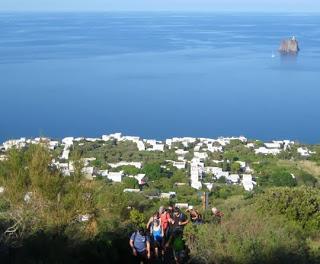
Hiking up Stromboli
It was sunset when we reached the summit, looking down into several steam-spouting craters, with the sea beyond, and as darkness fell we witnessed thunderous explosions about every ten minutes.I managed to catch photos of one of them. Spectacular stuff, along with glowing stones that glittered on the rocks after the explosions ended.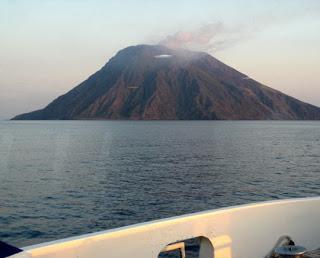
View of Stromboli from the ferry
The walk down the gritty trail in the dark (with headlamps) was nearly as difficult as the hike up. The next day we spoke to people who had watched the same eruptions from a boat off the island, and from a restaurant halfway up the volcano.Next time…..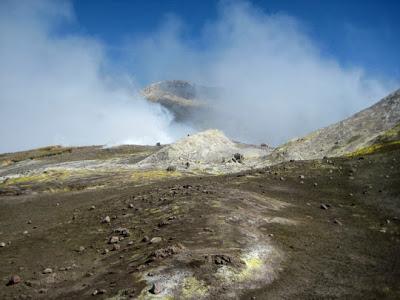
Top of Etna
A few days later, when we reached Mount Etna (11,000 ft.) I was pleased to learn that we could travel nearly 9600 ft. by cable car and van.The hike from there was a walk in the park – a moonscape park covered in black lava gravel. And at the top – a wild wind blew the sulfurous smoke in all directions as we stood on the edge of several steaming craters of unseen depth. Fantastic!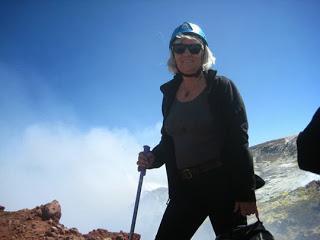
Gretchen on Etna
The most dangerous part of entire trip to Sicily though, was probably the driving. Two weeks of small Italian cars randomly creating an extra lane to the left or right of you as you made your way through traffic jams in the cities. “Streets” so narrow that you have to fold the side mirrors on your Fiat Panda to creep through. Cobbled village streets so steep you invoke all the saints for your eventual release. Cars passing on hills and curves with no regard for that solid white line down the middle of the road.Cars double-parking at will, parking perpendicular to the curb, parking on the sidewalks, etc etc. And most perplexing of all, a lack of street signs that rendered useless my Google map directions. Enter friendly Sicilians who were quick to stop in the middle of the road to guide us on a bit further before we got lost again.Or to call their Australian wife who could translate for us.Or who jumped in their cars to lead us to the next part of the journey. Or who gathered everyone in the shop to study the online map and determine how to guide us to where we wanted to go.
Sicilian pizza
As for the food in general and the pizza in particular, experts say it’s the best in the world outside of Naples – but since we didn’t get to Naples, I was mightily satisfied.On Stromboli we stayed in the Hotel Ossidiana http://hotelossidiana.com/en/index.php and ate delectable pizza at Luciano’s.[ http://www.ristorantedaluciano.it/index_eng.htm] We spent two nights on Etna at the Rifugio Sapienza, [http://www.rifugiosapienza.com]and ate risotto and pasta in their excellent restaurant, while watching a video showing Etna’s eruptions in the last ten years. They closed the mountain to visitors for three years, from 2010 until April 2013.
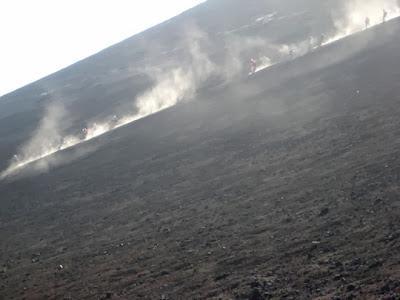
Climbing down Etna
Mount Etna erupted again on October 26, 2013. For some amazing video of the eruption, click here:http://www.theguardian.com/world/video/2013/oct/26/italy-s-mount-etna-volcano-erupts-video
Some good reading about Sicily:
Andrea Camillerihas written a long series of terrific mysteries about Inspector Montalbano.See “Andrea Camilleri Montalbano series” at Amazon.com. Even better is the TV version, in Italian (!) with subtitles. http://www.ovguide.com/tv/inspector_montalbano.htm
Leonardo Sciascia is an acclaimed Sicilian writer, some of whose books have been translated.I recommend• The Wine Dark Sea(short stories)• Sicilian Uncles (four novellas)
Daphne Phelps, A House in Sicily, describes moving to Sicily from England in 1947 and adapting to the local culture, including the Mafia.Simetti, Mary Taylor, Persephone’s Island: A Sicilian Journal, tells the story of an American young woman who travels to Sicily in 1962, marries a Sicilian andmakes a life there.
